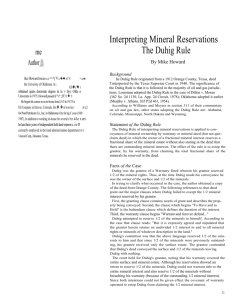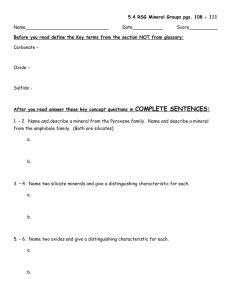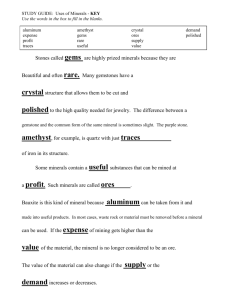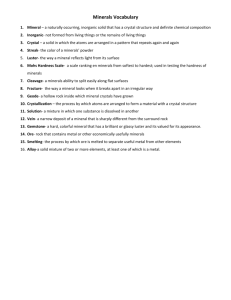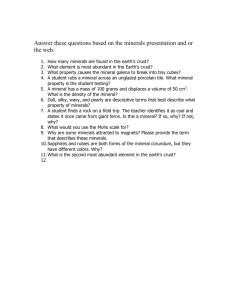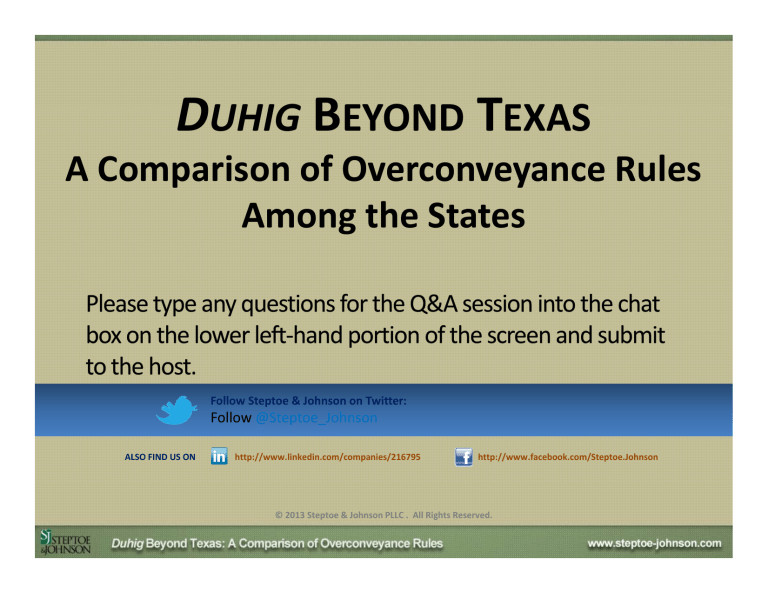
DUHIG BEYOND TEXAS
A Comparison
p
of Overconveyance
y
Rules
Among the States
Follow Steptoe & Johnson on Twitter:
Follow @Steptoe_Johnson
ALSO FIND US ON
http://www.linkedin.com/companies/216795
http://www.facebook.com/Steptoe.Johnson
© 2013 Steptoe & Johnson PLLC . All Rights Reserved.
Keynote Speaker
Zachary W. Gaver
The Woodlands,, TX
DUHIG BEYOND TEXAS
A Comparison of Overconveyance Rules
Among the States
Overview
• What is Duhig?
• When
Wh d
do we have
h
a Duhig
D hi problem?
bl ?
• Hypothetical examples
• Exceptions to Duhig
• State by state comparison
• Preventative and curative solutions
What is Duhig?
• The Duhig Rule is applied to conveyances
off mineral
i
l ownership
hi in
i which
hi h the
h owner
of a fractional interest reserves a share of
the mineral estate without also stating
that there are outstandingg interests.
• Effect: Estops the Grantor from claiming
th ttotal
the
t l fractional
f ti
l share
h
off minerals
i
l he
h or
she reserved in the deed.
Duhig v. Peavy‐Moore Lumber Co.
O
D hi
Duhig
O conveys to
Duhig: Reserves
½ of the minerals
Duhigg conveys
y
to
Peavy‐Moore Lumber
Co.: Reserves ½ of the
minerals
Peavy‐Moore
Peavy
Moore Lumber Co.
‐ Duhig v. Peavy
Peavy‐Moore
Moore Lumber Co., 144 S.W.2d 878 (Tex. 1940)
Effect of Duhig
Pre‐Duhig
Pre
Duhig
Applying Duhig
O:
1/2
Duhig:
1/2
Peavy‐Moore: 0
O:
1/2
Duhig:
0
P
Peavy‐Moore:
M
1/2
Duhig Rule
Where full effect cannot be given to both the
interest granted and the interest reserved
reserved,
priority will be given to the interest granted.
‒ If the Second Grantor overconveys by
warrantyy deed,, the overconveyance
y
amounts to a breach of said warranty, and
will come out of the Second Grantor’s
Grantor s
interest.
When Do We Have A Duhig Problem?
1. Determine the mineral interest which is outstanding
at the time of the conveyance (of the Original Grantor)
2. Determine the mineral interest that is purportedly
being conveyed (by the Second Grantor to the
Grantee)
3 Determine the mineral interest that is purportedly
3.
being reserved (by the Second Grantor)
4 Add the purported conveyance
4.
conveyance, the purported
reservation, and the outstanding mineral interest
Add The Interests
1.
2.
3.
4.
Mineral interest conveyed:
Mineral interest reserved:
Mineral interest outstanding:
Total:
½
½
½
150%
Duhigg
O
O conveys to Duhig:
Reserves ½ of the
minerals
Duhig conveys to Peavy‐
Moore
Lumber
Co.:
Reserves ½ of the
minerals
Peavy‐Moore Lumber Co.
Do the Interests Add to More Than 100%?
If so, we have a Duhig problem…
The Interests Add To More Than 100%...
Now What?
Rule: Where full effect cannot be given to
both the interest granted and the interest
reserved, priority will be given to the interest
granted.
•O
Original
i i lG
Grantor’s
’ (“O”) iinterest remains
i
untouched
• The Grantee’s interest comes out of the
Second Grantor
Grantor’ss portion
Applying the Rules
Duhig
O
O conveys to Duhig:
Reserves ½ of the
minerals
Duhig conveys to Peavy‐
Moore
Lumber
Co.:
Reserves ½ of the minerals
Peavy‐Moore Lumber Co.
O:
Duhig:
Peavy Moore:
Peavy‐Moore:
½
0
½
Hypothetical 1
A
O
A conveys to B: Reserves
1/3
/ of the minerals
O conveys to A: Reserves
1/3 of the minerals
B
O:
A:
B:
1/3
0
2/3
Hypothetical 2
A
O
A conveys to B: Reserves
1/8
/ of the minerals
O conveys to A: Reserves
3/8 of the minerals
B
O:
A:
B:
3/8
0
5/8
Hypothetical 3
A
O
A conveys to B: Reserves
7/8
/ of the minerals
O conveys to A: Reserves
3/8 of the minerals
B
O:
A:
B:
3/8
1/2
1/8
Hypothetical 4
O
A
O conveys to A:
Reserves 7/8 of
the minerals
A conveys to B:
No reservations
B
O: 7/8
A: 0
B 1/8
B:
Hypothetical 4
• “Duhig is a shield, not a sword”
‒ Estoppel principle
• After acquired
q
title
‒ BUT… subsequent to the deed conveying,
if the Second Grantor later acquires an
interest in all or part of the minerals, the
mineral interest acquired by the Second
Grantor immediately inures to the benefit
of the Grantee
Exceptions To Duhig
1. Quit‐claim deeds
2. Oil, gas, and mineral leases
3. Partition deeds
4. Express provisions of royalty, bonuses,
and rentals
5. “For
“
allll purposes””
1. Quit‐Claim Deeds
Duhig rests on a breach of warranty theory
• Quit‐claim deeds do not warrant
y
g
anything:
‒ “A deed that conveys a grantor’s
complete interest or claim in certain
real property but that neither warrants
nor professes that the title is valid.”
‐ BRYAN A. GARNER, BLACK’S LAW DICTIONARY 352 (8th ed. 2005)
2. Oil, gas, and mineral leases
“Even though a lessee knows a lessor owns less than
the full fee title to the p
premises on which a lease is
sought, he often, if not usually, prepares and insists
upon a lease which purports to convey the entire fee
in order to make certain that no fractional interest is
left outstanding in the lessor. He is protected against
the possibility of being forced to pay royalty on a
greater interest than that actually owned by the
l
lessor
b the
by
h inclusion
i l i off a standard
d d proportionate
i
reduction clause in the lease.”
‐ McMahon v.
v Christmann,
Christmann 303 SS.W.2d
W 2d 341
341, 346 (Tex.
(Tex 1957)
3. Partition deeds
• In order for Duhig to apply, there must be a
conveyance of a mineral interest.
interest
• But, a “partition
p
merelyy dissolves the
tenancy in common between the parties . . .
Thus, in a partition deed no conveyance
occurs and, therefore, the Duhig rule does
not apply to partition agreements
agreements.”
‐ Zapatero v. Canales, 730 S.W.2d 111, 115‐16 (Tex. App.1987)
4. Express provisions of royalty, bonuses,
and rentals
Benge v. Scharbauer, 259 S.W.2d 166 (Tex.1953)
Scharbauer
O
Scharbauer conveys to Benge,
save and except 3/8 of the
minerals and 3/8 of the payment
of all bonuses, rentals, and
royalties
O conveys to Scharbauer:
Reserves ¼ of the minerals
Benge
4. Express provisions of royalty, bonuses,
and rentals
O
Scharbauer
O conveys to Scharbauer:
Reserves ¼ of the
minerals
Scharbauer conveys to Benge, save
and except 3/8 of the minerals and 3/8
of the payment of all bonuses, rentals,
and royalties
Benge
– Apply Duhig –
Mi
Mineral
l Interests:
I t
t
O:
1/4
Scharbauer: 1/8
Benge :
5/8
– Do Not Apply Duhig –
B
Bonuses,
R
Rentals,
t l R
Royalties:
lti
O:
1/4
Scharbauer: 3/8
Benge :
3/8
4. Express provisions of royalty, bonuses,
and rentals
“The rule of the Duhig case, in order to
remedy the breach of warranty, takes from
part of what the deed p
purported
p
the ggrantors p
to reserve to them, but that rule should not
be extended to change the express
agreement as to what interests the grantors
shall receive in bonuses
bonuses, rentals and royalties
under leases to be executed by the grantee.”
‐ Benge, 259 S.W.2d at 169
5. “For all purposes”
"And being the same land described in Warranty
deed from The Federal Land Bank of Houston to
W. C. Windsor, recorded in Vol. X‐2, Page 119,
Deed Records of Marion County,
County Texas,
Texas
reference to which is made for all purposes.“
‐ Harris v.
v Windsor,
Windsor 294 S.W.2d
S W 2d 798,
798 799 (Tex.
(Tex 1956)
• Not a description
• Provides notice that the deed is subject to
another reservation
State By State Comparison
State overconveyance rules generally fall into
one of two categories:
1. States that have explicitly adopted the
Duhig rule by name, or applied the
principle
p
p without citingg Duhig
g
2. States that have no law yet regarding a
Duhig scenario,
scenario but apply “estoppel
estoppel by
deed” principles, upon which Duhig is
b d
based
Arkansas
• EExpressly
pressl adopted,
adopted
but the rule could be
limited for “subjective
considerations.”
• Does not apply to
quitclaim deeds
– Hill v. Gilliam, 682 S.W. 2d 737 (Ark.
1985)
Arkansas
Peterson v. Simpson, 690 S.W.2d 720 (Ark. 1985)
O
1938: O conveys to A, reserves ½ of minerals
A
(2 conveyances in between)
C
1948: C conveys to D,
D reserves ½ of minerals
D
(4 conveyances in between)
H
H conveys to I, no reservations
I
O:
C:
I:
½
0
½
Arkansas
The court uses an “objective” interpretation,
BUT the court leaves the door open for
BUT…
future subjective interpretations:
– “Our decision in this case does not change
the ggeneral rule that subjective
j
considerations may be taken into account
in reformation cases involving the original
grantor and his immediate grantee.”
‐ Peterson, 690 S.W.2d at 724
11/20/2013
Colorado
• The Colorado Supreme
Court has applied the
concept of Duhig, but not
byy name.
• Appellate Courts have
recognized
d Duhig
h by
b name.
• Subsequent
decisions
demonstrate a reluctance
to fully apply Duhig
principles
i i l
Colorado
Brown v. Kirk, 257 P.2d 1045 (Colo. 1953)
A
O
O conveys
Reserves ¼
minerals
O:
A:
B:
¼
¼
½
A conveys to B: Reserves
½ of the minerals
to A:
of the
B
Colorado
In Brown v. Kirk, 257 P.2d 1045 (Colo. 1953), the
Supreme Court of Colorado applied Duhig principles,
but did not explicitly adopt Duhig.
In Appling
pp g v. Fed. Land Bank, 816 P.2d 297, 301
(Colo. App. 1991), the Court of Appeals, Division
Three, recognized that Duhig was applied in Brown
v. Kirk:
k “Brown
“
represents the
h application
l
off the
h
Duhig principle.”
Colorado
A reluctance to fully apply Duhig principles …
In Appling, the Court stopped short of applying Duhig
to the current case based on procedural grounds:
“We refuse to consider these issues. Barth has taken
no cross‐appeal of the trial court’s determination . . .
as an appellee that has not pursued a cross‐appeal,
[B h] is
[Barth]
i precluded
l d d from
f
presenting
i these
h
additional
ddi i
l
issues.”
‐ Appling, 816 P.2d at 301.
North Dakota
• North Dakota has expressly
adopted
d
d Duhig,
h
b
but
with
h
limitations
‐ Acoma
co a O
Oil Corp.
o p v. Wilson,
so , 471
N.W.2d 476 (N.D. 1991)
• Limited by Gilbertson v.
v
Charlson, 301 N.W.2d 144
(N.D. 1981)
• See also: N.D. Mineral Title
Standards §3‐07
North Dakota
Limitation:
Duhig does not apply when Grantee has actual knowledge
‐ Gilbertson v. Charlson, 301 N.W.2d 144 (N.D. 1981)
Grantee already owned a 1/3 interest in the land prior to the conveyance
A (1/3)
B (1/3)
C (1/3)
O
Intestate
Succession
A
Reserve: 50% of oil
and gas
North Dakota
Note: Sibert v. Kubas, 357 N.W.2d 495, 497 (N.D. 1984)
limited Gilbertson to "its application to the peculiar
facts of that case wherein the grantee,
grantee prior to the
disputed conveyance, owned an outstanding mineral
interest
te est in tthee p
property
ope ty co
conveyed.”
eyed
Reaffirmed support for Duhig
Oklahoma
• Cites and applies
Duhig with the same
result as in Texas
‐ Bryan v. Everett, 365 P.2d
146 (Okla.
(Okla 1961)
• See also:
‐ Birmingham v. McCoy, 358
P.2d 824 (Okla. 1960)
Oklahoma
“Where the conveyance represents that the grantor is
the owner of a particular interest in property and such
interest is conveyed by the deed,
deed the grantor is
estopped by his general warranty to claim that the
deed co
conveyed
eyed a less
ess estate tthan
a ggrantor's
a to s co
complete
p ete
ownership.”
y v. Everett, 365 P.2d 146, 148 ((Okla. 1961))
‐ Bryan
Wyoming
• Wyoming has expressly
adopted Duhig
‐ Body v.
v McDonald,
McDonald 334 P.2d
P 2d 513
(Wyo. 1959)
• Notice is completely
irrelevant
Wyoming
O conveys to A:
Reserves ¼ of oil
and gas
O
Traditional Duhig:
O:
A:
B:
¼
0
¾
A conveys to B:
Reserves ¼ of oil
and gas
A
B
A
B
BUT… B executes a
mortgage
to
A,
acknowledging A’s ¼
interest
Body v. McDonald, 334 P.2d 513 (Wyo. 1959)
Wyoming
Notice is completely irrelevant!
• A argued that the case was distinguishable from Duhig
because actual knowledge existed, and B even admitted
actual knowledge.
actua
o edge
• “But inasmuch as purchasers of real property usually
examine the title thereto,
thereto it is highly probable that the
purchasers in those cases had knowledge of an outstanding
mineral interest just as is true in the case at bar. While
conjecture it is not unlikely that the matter was not
conjecture,
considered worthy of attention either by counsel in those
cases or by the courts rendering the decisions.”
‐ Body v. McDonald, 334 P.2d 513, 517 (Wyo. 1959)
Estoppel by Deed States
Estoppel
pp byy warrantyy – ggenerallyy p
precedes Duhig
g
principles
For example
example…
Louisiana: See Dillon v.
v Morgan,
Morgan 362 So.
So 2d 1130
(La. Ct. App. 1978), citing Hodges v. Long‐Bell
Petroleum Co., 121 So.2d 831 (La. 1960) for the
premise of an estoppel by deed or estoppel by
warranty theory.
Estoppel by Deed
These states have not specifically adopted Duhig, but
follow “estoppel by deed” principles, upon which
Duhig’s rationale is based.
Estoppel by deed definition:
“E
“Estoppel
l that
h prevents a party to a d
deed
d ffrom
denying anything recited in that deed if the party
has induced another to accept or act under the
deed.”
- BRYAN A. GARNER, BLACK’S LAW DICTIONARY 470(8th ed. 2005)
Estoppel by Deed States
M t
Montana
N b k
Nebraska
Ohi
Ohio
Estoppel by Deed States
Case Law
Montana
– Hart v. Anaconda Copper Mining Co., 222 P. 419
(Mont. 1924)
Nebraska
– Hagensick v. Castor, 73 N.W. 932 (Neb. 1898)
Ohio – “estoppel estate”
– Peters v.
v Nelson,
Nelson 730 N
N.E.2d
E 2d 1011 (Ohio Ct.
Ct App
App. 1999)
Estoppel by Deed States
Pennsylvania
West Virginia
Estoppel by Deed States
Case Law
Pennsylvania
– Jordan v. Chambers, 75 A. 956 (Pa. 1910)
West Virginia
– Wellman v. Tomblin, 84 S.E.2d 617 (W. Va. 1954)
– See also W. VA. CODE § 36‐1‐10 (2013)
Duhig Policy
Arguments for:
Protect bonafide purchasers
Arguments against:
The examiner and the court must usually completely
ignore constructive and actual notice.
May give Grantee more than he or she bargained for
George A.
A Snell,
Snell III
III, Dallas Bar – Energy Section Luncheon: Is Duhig Done? A Rebuttal (May 18,
18 2011)
Are Grantors out of luck?
Grantor Solutions – Prevention
Use a Quit‐Claim Deed
Use “For all purposes” – reference prior deed
‐ Harris
i v. Windsor,
i d
29 SS.W.2d
294
2d 798,
98 799
99 ((Tex. 1956)
9 6)
Grantor Solutions ‐ Prevention
Language
L
excepting
ti a specifically
ifi ll described
d
ib d interest
i t
t
‐ Identify the previously reserved interest!
Language excepting in a general manner all previously
recorded mineral interests and other encumbrances
‐ George A.
A Snell
Snell, III
III, Dallas Bar – Energy Section Luncheon: Is Duhig Done? A
Rebuttal (May 18, 2011)
Curative Solutions
(what title examiners will recommend)
Prior
P
i to
t distributing
di t ib ti any proceeds
d from
f
production
d ti
attributable to the Subject Land…
1. Stipulation of interest and cross‐conveyance
Record the document to give third parties
notice
2. Proper division orders reflecting the actual
interests of the parties
Recognizing Duhig Issues
1 The instrument is a warranty or mineral deed
1.
As opposed to a quit‐claim deed
2. Less than the entire mineral ownership is being
transferred
Look for a mineral reservation by the Second
Grantor
‐ Mike Howard, Interpreting Mineral Reservations: The Duhig Rule, LANDMAN,
Sept ‐Oct 1996,
Sept.‐Oct.
1996 21,
21 22
22.
Recognizing Duhig Issues
3 The Second Grantor owns less than the entire
3.
mineral interest at the time of conveyance
4. Nowhere in the deed does the Second Grantor
indicate that he is excepting from the warranty any
prior
i reservations
ti
or conveyances
“For all purposes” or other deed references
‐ Mike Howard, Interpreting Mineral Reservations: The Duhig Rule,
LANDMAN, Sept.‐Oct. 1996, 21, 22.
Recognizing Duhig Issues Checklist
ALL FOUR MUST BE MET FOR DUHIG TO BE AT ISSUE…
IIs th
the instrument
i t
t a warranty
t or mineral
i
l deed?
d d?
If the instrument is a quit‐claim deed, no Duhig issues will arise
Is less than the entire mineral ownership is being transferred?
If the whole mineral estate is being transferred
transferred, no Duhig issues will
arise
Does the Second Grantor own less than the entire mineral interest?
If the Second Grantor owns the entire mineral interest,
interest no Duhig
issues will arise
Does the deed from the Second Grantor indicate that he is excepting
from the warranty any prior reservations or conveyances or record?
If the deed excepts prior reservations or conveyances of record,
Duhig will not apply
Points to Takeaway
• The Duhig Rule is applied to conveyances of mineral
ownership in which the owner of a fractional interest
reserves a share of the mineral estate without also
stating that there are outstanding interests
• The goal of the rule is to make the grantee whole
• Where full effect cannot be given to both the interest
granted and the interest reserved
reserved, priority will be given
to the interest granted
• Oil producing states outside of Texas have generally all
adopted some form of Duhig, while states that have not
have established legal
g authorityy which would allow
them to do so
Thank You!
Zachary W. Gaver
The Woodlands
Woodlands, TX
281.203.5735
zachary.gaver@steptoe‐johnson.com
achar ga er@steptoe johnson com
Material Disclaimer
These materials are public information and have been prepared solely for
educational purposes to contribute to the understanding of energy and oil
and
d gas llaw. Th
These materials
i l reflect
fl only
l the
h personall views
i
off the
h authors
h
and are not individualized legal advice. It is understood that each case is fact‐
specific, and that the appropriate solution in any case will vary. Therefore,
these materials may or may not be relevant to any particular situation.
situation Thus,
Thus
the authors and Steptoe & Johnson PLLC cannot be bound either
philosophically or as representatives of their various present and future
clients to the comments expressed in these materials. The presentation of
these materials does not establish any form of attorney‐client relationship
with the authors or Steptoe & Johnson PLLC. While every attempt was made
to insure that these materials are accurate, errors or omissions mayy be
contained therein, for which any liability is disclaimed.

